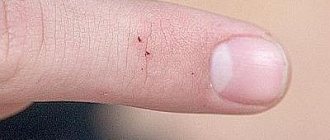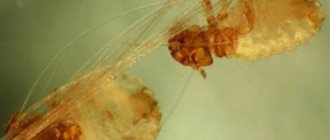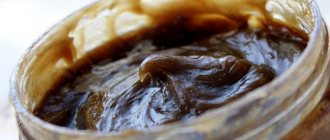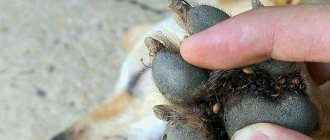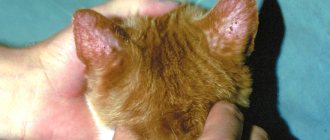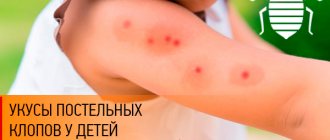Dogs, especially those living in cities, where they, like humans, are negatively affected by a large number of unfavorable factors, ranging from the environment to allergenic foods, are susceptible to a variety of diseases.
Often our faithful friend begins to itch for no apparent reason, licks or even chews on the itchy area of skin. May scratch an itchy area of skin until a sore appears and cause a staph infection (staph infection in dogs) or streptococcal infection (streptococcosis in dogs and cats).
In such a situation, dog owners strive to establish the cause of this behavior as quickly as possible, to determine and understand why the dog suddenly began to constantly itch and gnaw on certain parts of the body.
Causes of itching in dogs
Various ectoparasites.
Insects that parasitize animals include not only the well-known fleas (fleas on dogs), but also other arthropods - lice, ticks (ticks on dogs), lice eaters.
Owners who have treated their dog for fleas cannot be completely sure that they have managed to get rid of them. Since flea eggs and larvae can remain on the dog's bedding, in furniture upholstery and carpets. Therefore, you need to once again carefully examine the dog’s fur to identify eggs and adult fleas.
If the dog continues to itch, but does not have fleas, you need to examine the skin for the presence of other insects:
Ticks : dogs are most often parasitized by three types of ticks: Ixodidae - are the largest ticks, which in a hungry state reach 2-3 mm in length, and when fed with blood - up to 1-1.5 cm. Scabies (internal, ear). Subcutaneous (demodectic).
After a tick attack, dog owners usually note the following symptoms in their pets: lethargy, low activity, the dog lies down more, and begins to itch. There is a change in the color of urine (the urine becomes dark, sometimes acquires a brown, brown or red tint). The visible mucous membranes and sclera of the eyes have an icteric tint. Body temperature rises to 40°C and above. Shortness of breath appears, the dog has difficulty breathing.
An attack by ixodid ticks on a dog can cause life-threatening diseases such as piroplasmosis (pyroplasmosis (babesiosis) of dogs), Lyme disease, ehrlichiosis, and hemobartonellosis. The secretion of the salivary glands of mites leads to severe itching and scratching in the dog's head, ears and neck. Externally, the dog itches all the time and scratches its skin.
Scabies mite (itchy) - parasitizes a dog's ears, where it feeds on the secretions of the sebaceous glands and wax. To get to the lymph, it gnaws passages in the skin, as a result, the affected area of the dog begins to itch very much, the dog begins to intensively scratch these areas with its front and pelvic limbs, shake its ears, and rub its auricle against surrounding objects.
With severe infestation, the dog constantly moves and practically does not sleep. Upon examination, abrasions, scratches, wounds, pustules and areas of baldness are visible on the head and ears. Otodectosis in dogs is often accompanied by weakening of hearing, up to its complete loss. From the affected ear there may be discharge of various types, most often serous, which is later replaced by purulent discharge (ear diseases in dogs).
The subcutaneous mite is capable of parasitizing on the surface of the epidermis for a long time, feeding on horny scales. When immunity decreases, the mite penetrates deep into the skin, causing severe itching. Infection with subcutaneous mites (demodex) causes a dog to lose appetite, the dog becomes depressed, itching appears, redness of certain areas of the skin, the formation of scabs, nodules on the skin and the inner surface of the ears, scratching and red spots appear on the nose, around the mouth and eyes.
For more information about demodicosis in dogs, see our article - treatment and prevention of demodicosis in dogs.
Vlaseaters.
Owners can, after consultation with a veterinarian, prevent a dog from becoming infected with ticks, lice eaters and fleas by treating the dog with one of the medications in the form of a spray (Bars, Bolfo, Frontline, Defendog), drops (Serco, Bio Spot on drops, Advantis, Ralph Club, Prak- teak, Stronghold), or wearing a protective collar against ticks (Kiltiks, Foresto).
Allergic reaction to various irritants
If an examination for the presence of ectoparasites in a dog gives a negative result, and the dog continues to itch constantly, then you should suspect an allergy that is widespread in our time, which is caused by the following factors:
- Household chemicals and hygiene products.
- Bites by ectoparasites.
- Food allergies.
- Reaction to vaccination against infectious diseases and medications used in treatment.
Infection of a dog with fleas leads to allergies; secretions of the salivary glands of fleas when they enter the bloodstream lead to a reaction on the part of the animal to the foreign protein introduced into its body. Especially when the dog has already suffered from a flea attack.
Food allergies in dogs are caused by proteins or non-protein components of food (food allergy in animals). To distinguish intolerance to certain foods from a true allergy, dog owners should contact the clinic’s veterinary specialists, who will carry out the necessary differential diagnostics and determine the cause of the allergy.
Allergies in dogs are most often caused by foods such as milk, horse meat and beef. The second group of allergenic foods for dogs are soy, chicken, and lamb. Many premium foods purchased by owners contain the products listed above.
A dog's allergy is accompanied by such severe itching that the dog itches by biting these places. At the site of severe licking, hair falls out, leading to complete baldness, discoloration of the coat, pyoderma, coarsening and hyperpigmentation of the epidermis.
Young dogs under 5 years of age are most susceptible to the disease. Of the breeds that suffer most from food allergies: pug, boxer, sharpei, chow chow, cocker spaniel, beagle, German shepherd, labrador, etc.
Allergies can be triggered by improper use of medications - eye and ear drops, sulfur ointment and other irritating ointments, vaccines, etc. The manifestations are the same as with other types of allergies. If your dog itches after taking flea drops, then it is highly likely that he is allergic to this product.
Skin diseases
The dog itches a lot and with various skin diseases. The most common are lichen (ringworm in dogs), wet or dry eczema, and dermatoses.
Dermatosis, one of the symptoms of which is itching, can be caused by contact with the collar. This form of the disease is often observed in puppies, since their delicate skin is very sensitive to constant exposure to insecticides. The puppy is itching, trying to remove the collar.
To treat allergic reactions, veterinarians prescribe cortisone and other antihistamines that help relieve skin manifestations and itching (Benadryl, Tavist, Amitriptyline, Atarax).
Dermatophytosis in dogs
Dermatophytosis is often seen in puppies, young animals, and dogs with compromised immune systems. Mycoses cause not only itching, but also hair loss, nodular lesions of the skin, peeling and yellowing of the nails, peeling and cracking of the pads on the paws.
Veterinary specialists for dermatophytosis in sick dogs prescribe body treatment with antifungal agents - shampoos (Nizoral, Dermazol) or the drug for dogs Imaverol. For systemic treatment, the following drugs are used - Orungal (Itraconazole), Lamisil (Terbinafine), Nizoral, Oronazole (Ketoconazole).
In healthy dogs, dandruff is absent or invisible. Dandruff flakes can form under the influence of various factors that cause dry or oily seborrhea. When a Spitz itches or the itching bothers representatives of other “sofa” breeds, the cause is dry seborrhea. These animals are bathed frequently, which leads to dysfunction of the sebaceous glands and dry skin. Also, a lack of fat leads to the formation of dry dandruff. If the cause is not a fungal infection or systemic diseases, then the doctor prescribes antiseborrheic shampoos.
Inflammatory dermatitis often occurs in dogs with large folds of skin. If a pug itches, or a chow-chow, bulldog, or mastiff scratches its muzzle with its paws, then it is worth checking the folds, where you can detect redness of the skin and increased humidity, swelling and destruction of the epidermis.
Treatment of dermatoses begins with treatment with antibacterial, disinfectant detergents, and then treated with drying preparations. If the process is advanced, the doctor prescribes antibiotics.
Hyperfunction of the sebaceous glands
Some dogs have a pathology called “greasy tail.” This pathology is more common in cats, but can also occur in dogs. Hyperfunction of the sebaceous glands, located like a rosary on the upper surface of the tail and around its base, leads to sticking of the hair, the formation of black spots on the skin, and the appearance of oily seborrhea. Itching causes the dog to chew its tail, “ride” on its butt, and causes severe discomfort. A dog's licking of affected areas can cause alopecia or serious tail injuries.
Treatment consists of treating the wool with special shampoos to regulate the function of the sebaceous glands. Until the cause of the hyperfunction is determined, this is the only method to help the dog.
Stress
In dogs, the nervous system reacts to prolonged exposure to stress factors with various manifestations, including skin ones. Short-term factors - a visit to the doctor, injections, a sharp shout, an unpleasant strong odor - cause a reaction that disappears when the irritating factor disappears. Prolonged stress can lead to various external manifestations, including increased licking and biting of certain parts of the body due to allergies or seborrhea.
Treatment consists of eliminating the stress factor, providing positive emotions, and distraction. Occupational therapy brings a good therapeutic effect. For chronic stress, your doctor may prescribe sedatives.
Diagnosis of the causes of itching in dogs
To correctly determine the cause of itching in a dog and receive recommendations for treating the dog, owners should contact the veterinary clinic at their place of residence.
Veterinary specialists will conduct a full clinical examination of your dog, carefully examine the skin in areas of scratching, hair loss, examine the ears for ticks, etc.
To determine the type of parasite or microorganisms that cause itching in the dog, a skin scraping will be taken from the affected area and sent to a veterinary laboratory.
They will take and conduct a blood test to rule out an allergic nature of the skin itching.
In some veterinary clinics, by intradermal injections of one or another allergen, they can determine the cause of the allergic nature of itching in your dog.
Whatever causes the dog’s itching, the owner should pay close attention to this and promptly contact a veterinary hospital. Self-medication can not only cause serious consequences, but also miss the time required for a complete cure.
Stress and anxiety
Puppies have high levels of energy that they must expend on a daily basis, if they are not given enough activity to deplete and replenish the energy, it builds up and transforms into behaviors that we humans don't like, such as housebreaking, repetitive movements or patterns. , hyperactivity, hair loss and others. Your puppy's constant scratching can be caused by stress and anxiety, as this behavior is part of hyperactivity. To avoid these problems, it is important that you learn to recognize some signs of stress in your dog, like those discussed above. Once you notice these symptoms, it is important to help your dog relax and change some habits so they don't happen again.
Treatment of itching of various etiologies
Considering that itching in a dog is one of the symptoms of any disease, veterinary specialists, when treating your dog, will direct their main efforts to treating the specific disease that led, among other things, to the fact that your dog is itching.
Depending on the cause of the itching, veterinarians may use the following treatments:
- With increased sensitivity and irritability of the skin, dog owners should first of all normalize the feeding diet. The dog's diet must be balanced in nutrients and also contain the required amount of vitamins and minerals. In this case, it is necessary to exclude spices and fatty foods. To relieve skin irritation, use ointments and drops prescribed by a veterinarian; use an alcohol solution of tar prepared in a ratio of 1:10. During the course of treatment, owners should perform water procedures using soothing soap at least once a week. For the period of treatment, exclude meat from the diet.
- Treatment of food allergies in dogs should be based on providing the dog with a specific hypoallergenic diet. When treating a dog, in addition to completely eliminating the identified allergen, there is no need to give vitamin supplements, chewing toys, food high in carbohydrates, or treats. Antihistamines (diazolin, suprastin, diphenhydramine, tavegil, etc.) and glucocorticosteroids (dexamethasone, hydrocortisone, prednisolone, etc.) that reduce histamine levels and eliminate itching and swelling are used as symptomatic drugs.
- In the case when a dog’s itching is caused by the wet variety of ringworm, the drugs Mercurius and Sulfur are used for treatment. These medications must be used in accordance with the instructions. Additionally, to treat lichen, you can use bandages with medicinal ointments and water procedures with creolin soap. When carrying out treatment, we exclude meat products and potatoes from the diet.
- If itching caused by lichen sicca in a dog, in order to prevent infection of other animals, you will need to isolate the sick dog from them. The dog should be bathed and washed with soothing soap as often as possible, and before bedtime, the affected areas of the skin should be treated with linseed oil. Phosphorus 3 or Dulcamara 3 is added to the dog's food, no more than 5 drops per day.
Why does he whine often?
Experiencing itchy skin, the puppy cannot tolerate it and, accordingly, tries to relieve it by scratching. The skin becomes injured and begins to hurt, which is why the puppy begins to whine and scratch himself even more, trying to get rid of the pain this time.
If your pet behaves this way, then you should definitely show it to the veterinarian. The earlier the disease is detected, the more effective its treatment will be.
Preventing itching in dogs
Prevention of itching in dogs by owners should be based on preventing the causes that cause itching. To reduce the likelihood of itching in dogs, dog owners should follow these recommendations:
- Provide balanced feeding for your pets; the diet should not be dominated by fatty foods or foods with a predominance of protein. (Basics of feeding dogs. Golden rules for rational feeding of dogs. Feeding puppies. Feeding aging dogs. Feeding pregnant females. Feeding lactating dogs).
- Carry out periodic treatments of the coat against ectoparasites, especially during walks outside the city and in nature.
- Regularly, especially after returning from a walk, inspect the skin for the presence of parasites (ticks, fleas).
- For dogs that are hypersensitive to allergic reactions, purchase hypoallergenic food for feeding.
- At least 2 times a year undergo preventive examinations at a veterinary clinic.
Clinical picture
On the affected areas of the paws, there is most often a papular-pustular rash (small red pimples and pustules), erythema (redness) of the skin, peeling, there may be small scratches and hairless areas. Sometimes single or multiple “nodules” can form in the interdigital space - dense painful formations, which after some time open with the release of pus. Lesions can occur on one limb or on several at once. The skin of the interdigital spaces may be affected both from the side of the pads and from the opposite side.
Adviсe
To summarize, here are some final tips regarding the issue of itching in dogs:
- When the first symptoms appear, you should urgently visit a specialist and not self-medicate. Itching in most cases is only one of the symptoms, and not an independent disease, and only a veterinarian can make an accurate diagnosis. The sooner this is done, the better, since most ailments are much easier to treat in the initial stages.
- When treating dogs externally, the product should be applied to places where the pet cannot reach and lick it off its fur. For the same reason, isolation from other animals is also required.
- One of the main symptoms that occurs in parallel with itching, which should alert the owner, is an increase in the amount of water consumed. Other factors that require attention are the appearance of unpleasant odors and changes in the pet's behavior.
- If the itching was caused by parasites or fungal growths, then not only treatment of the dog is required, but also disinfection of the entire apartment and pet care items, otherwise relapses are possible.
- If there is any damage on the surface of the skin caused by scratching or other reasons, then it is not allowed to carry out water procedures using shampoo without obtaining permission from a specialist, since this can only increase inflammation and itching.
Constantly bites himself, but his skin is clear
If the puppy has clear skin, and the veterinarian has established the fact that there is not a single parasite on the animal’s body, then there may be two reasons why it is constantly itching:
- Stress. The puppy may be nervous due to separation from its mother and brothers, a sudden change of place of residence, tense relationships with new owners or other furry neighbors in the apartment. If the source of dog stress is not eliminated in time, the animal may scratch itself into bloody bald spots.
Reference! Most often, nervous scabies are not the only symptom of stress. Added to this is inappropriate behavior, refusal to eat, a mania for digging or putting marks directly on furniture.
- Diseases of internal organs. Diabetes mellitus, liver or kidney failure - these diseases quite often cause a dog to scratch its skin.
